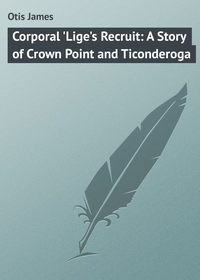 полная версия
полная версияA Runaway Brig: or, An Accidental Cruise
"We must keep our weather-eyes liftin' every minute, an' at the first sign of a row pitch in so's to take 'em unawares;" and Bob stretched himself out on the port locker as if determined to enjoy all possible comfort before the serious work of sailing the brig without an experienced navigator was begun. "I wouldn't hesitate to give 'em the slip by leavin' the whole crowd here; but there's no chance of their goin' ashore after the wind rises."
"No," Joe replied, with a long-drawn sigh, "we shall have to grin an' bear it, I reckon; but – "
He ceased speaking very suddenly, for just at that moment a footstep was heard on the steamer's deck, and an instant later the unpleasant-looking face of the man with the red nose appeared at the companion-way.
"You all got outer sight so quick that I thought p'rhaps you'd gone overboard," he said with a leer, glancing inquisitively around the cabin, but making no motion to descend.
"Joe is overhaulin' this dunnage, to see if there's anything worth carryin' back to the States," Bob replied carelessly, as the engineer continued his work in silence.
The man lowered his head as if to see the interior more plainly, and, unperceived by any one in the little apartment, made a quick motion with his hand, evidently for the benefit of those aboard the brig.
During nearly five minutes he stood there carelessly pushing the hatch back and forth, until the Mexican waved his hat, when the red-nosed man suddenly shut both doors, shoving into place the bolts which fastened them together.
The little party in the cabin looked up in surprise at this singular maneuver, but it was not until the sound of quick footsteps was heard on the deck as the man ran swiftly aboard the brig that any one thought of treachery.
"They've locked us in here so's they can steal the Bonita!" Bob shouted, as he leaped to the companion-way and began pounding on the bolted doors.
The oaken timbers were firm as a bulk-head, and, without a weapon, he might have worked there all day in vain.
Joe had sprung to the windows; but his efforts were quite as useless as Bob's. Heavy iron gratings, intended to keep out intruders and break the force of the waves, were screwed so firmly in the wood-work that they could not be removed from the inside save by the use of proper tools.
They were securely imprisoned, for the cabin had no outlet except at the companion-way, and two or three hours of hard work would be absolutely necessary before they could escape by the doors.
While Bob and Joe were darting from one possible point of vantage to another, shouting for help and uttering wild threats in the same breath, the boys had gathered at one of the port windows which looked directly on the brig's bulwarks.
"They ain't gettin' under way!" Jim cried, as if trying to persuade himself that the strangers were not intending to desert them.
"There's no need for the pirates to hurry," Bob said hoarsely, as he stood in the center of the cabin, his face convulsed by rage and trembling like one in an ague fit. "If I had jumped on 'em with the belayin'-pin when Joe held me back, all of that crowd wouldn't be able to get away. Come here, you cowards, an' give us a fair show! Open this hatch or I'll foller you till your lives won't be worth the livin'!"
"The hawsers have been cast off, an' now the brig is beginnin' to move through the water!" Jim reported, as he pressed his face close to the iron bars.
This information gave fresh impetus to Bob's wrath. He rushed from one corner of the cabin to another shouting the wildest threats, and behaving generally like an insane person.
Joe was quite as angry as the old sailor, but not to such an extent that his common sense had deserted him. While Bob strode back and forth he was working on the screws which held the bars in place. By breaking off the end of the largest blade in his pocket-knife quite an effective tool was made, and he had accomplished no slight portion of his task when Jim made the last report.
Rapidly as the engineer might labor, however, he knew it would be impossible to remove this one particular barrier to freedom before the Bonita would be beyond their reach. The promised wind had come sooner than it was expected, as could be told by the rapidly increasing speed with which the black bulwarks of the brig slipped past the window, and the task was not half completed when blue water could be seen as the vessel's stern swept by, leaving a wake which bubbled and danced merrily in the sunlight.
"There must be a pretty good breeze," Jim continued, speaking excitedly, as if the tears were very near his eyelids, "for the upper sails are all drawing. Now I can see that red-nosed bully at the wheel, an' he's wavin' his hat!"
Joe continued to work at the bars, and now, when it was too late to effect anything, Bob recovered from his anger sufficiently to make at least an attempt at assisting, while Harry and Walter stood near the companion-way, so thoroughly bewildered by this last blow of a cruel fate that speech was well nigh impossible.
The brig remained within Jim's range of vision but a few moments longer, and when she disappeared entirely he threw himself on a locker, trying to stifle with its cushion the sobs which convulsed him.
Without speaking, breathing like one after a long race, and heeding not the wounds on his fingers inflicted by the sharp edge of the knife, Joe worked on until the iron grating was held in place only by a couple of screws on one side. Then, standing on the locker, he used his foot as a battering-ram until the wood-work gave way, and the bars fell to the deck with a clatter and a crash that must have been heard by those on the brig.
If it had been possible to overtake the thieves the prisoners could not have clambered out through the window more quickly, and on gaining the deck the uselessness of any further efforts was painfully apparent.
The Bonita was already out of the little harbor, bowing and courtesying on the ocean swell to the wind from the south which filled all her sails, and gliding through the water as if rejoicing at her escape from the shoal.
"Can't we row out to them?" Jim cried excitedly. "It wouldn't take long to launch the tug's yawl!"
"We couldn't catch 'em with anything slower than a steamer, now that they're well under way!" Bob cried angrily; and then, unfastening the hatch, he went into the cabin once more, as if unable to look longer at the rapidly retreating brig.
"It's no use, boys; we've got to make the best of what can't be cured!" Joe said with a great but vain effort to speak in a cheery tone. "We must try and forget what has happened or we shall be in no condition to help ourselves." Then, noting the tears in Walter's eyes, he added kindly: "Think of how much worse we might be situated. The Sea Bird isn't injured past mending, and in her we can make any port we choose."
"But you said it would be two or three weeks before she could be repaired," and Harry choked back a sob lest the evidences of his own grief should make Walter's sorrow greater.
"In that I may have been mistaken. Let's set to work as if nothing had happened, and think only about going home presently with no one on board of whom we are afraid. You boys get the yawl into the water, so we can land at any time, and I'll begin the job on the engine."
CHAPTER XVII.
REPAIRING THE SEA BIRD
It was extremely difficult for anyone on the tug to set about work while the sense of injury and grief was so fresh in his mind, and had it not been for Joe all hands would have given way to sorrow and anger, a course which could certainly bring no relief. He bustled around as if there was not a thought in his mind beyond repairing the engine, calling for assistance first upon one of the boys and then Bob, until they were absolutely forced to take an interest in the work.
He insisted that the yawl must be gotten into the water without delay, because his duties might necessitate his going ashore at a moment's notice; and it was nearly time for the sun to set before the little boat was in sailing trim. While the boys were engaged in this work Joe called upon Bob so often that the old sailor grew quite eager to see the job progress, and, like the others, almost ceased to dwell upon the bitter disappointment.
When the boat was launched, Joe advised the boys to go into the tiny galley of the tug for the purpose of getting supper, concluding by saying:
"It ain't as big as the one on the Bonita; but you'll find better tools to work with, because everything is new. There must be grub enough to last ten days or more; but if not, we'll do a little hunting and fishing. This is the season for turtles, so we can have plenty of meat and eggs; and there's no show of being put on short allowance, even if we should stay here a month."
This remark about food aroused Bob from the mournful reverie into which he had fallen for the moment, and he said with something like his old cheerfulness, as he started forward:
"I'll overhaul the stores, so we'll know jes' what there is on board; but it won't do any harm for you boys to go fishin' now an' then, seein' that you can't do very much work in the engine-room."
Then he went into the fore-peak. Jim and Walter built a fire in the stove, which occupied fully half the space in the tiny galley, and Harry set about laying the forward-cabin table with the limited collection of crockery.
Joe came from the hot engine-room when the others were fully occupied. He had not really begun, his task, nor did he intend to do so until the next morning when some kind of a bench could be set up in the open air, although he had moved about very lively to keep the minds of his companions on something besides their own misfortunes.
It was not long before Bob finished taking account of the eatables, and on coming from the hold he reported:
"We've got fully half a barrel of flour, about twenty pounds of salt pork, twice as much beef, and two hams. There's coffee enough to last this crew four or five weeks, with canned milk to help it out. Two dozen tins of assorted vegetables, three bushels of potatoes, plenty of salt, pepper, molasses and vinegar. Pretty nigh a whole tub of butter, another of lard, and a barrel two-thirds full of ship's-biscuit. We sha'n't starve yet awhile; but it stands us in hand to do some fishin' an' huntin' before we leave this place – if we ever do."
"Now, don't talk that way, Bob," Joe said with a laugh. "I give you my word that the engine can be repaired, so of course we shall leave here."
"How much coal have you got?"
Joe's face darkened. The fuel supply was the only thing of which he had not thought, and he knew there was only such an amount on board as would serve to keep up steam about forty-eight hours.
"I don't suppose we've got enough for the run across," he said after a short pause; "but we can take on plenty of wood, or make our way into Nassau, where, by giving a distress note on the steamer, it will be possible to get all that may be needed. If we could only manage to patch the bow a little better I wouldn't feel worried about anything."
"That's jes' what I've made up my mind to do," Bob replied. "If you don't call on me too often, I reckon I can show a pretty decent job of carpentering by the time you're ready to make steam."
"After to-morrow night I shan't need much help, so you'll have plenty of time," Joe said with a laugh; and then the conversation was interrupted by Walter's announcement that supper was ready.
Jim had taken especial pains with this meal, probably acting on the belief that grief is lessened when the stomach is satisfied, and all hands seated themselves at the table, which occupied nearly the entire floor-space of the little cabin, looking far more cheerful than one would have supposed under the circumstances.
"There's a big advantage about living here," Joe said, as he lighted the swinging lamp that the interior might seem more cheerful. "Everything is snugger than on the brig. We've got one bunk apiece, and none to spare; the bedding is clean because it's new, while Jim's work is easier owin' to the fact of the galley bein' alongside the dining-room."
"Yes," Bob said, as he choked down a sigh with a big piece of ham, "we're pretty well fixed considerin'; an' if the Bonita had gone to the bottom, or been burned up, I wouldn't feel sore a bit. It's the idea that the same villains we brought off the key to save 'em from starvation have run away with the brig which riles me. Howsomever," he added, as he helped himself to another potato, "it don't do any good to talk of sich rascality, an' we may as well chuck ourselves under the chin 'cause things are no worse."
Then Joe made sure the conversation would not again drift into such a dangerous channel by talking of the needed repairs until the meal was finished and the dishes washed, after which all hands went on deck to enjoy the cooling breeze.
"If we could sleep here it would be possible to take some comfort," Harry suggested, as the old sailor made preparations for his after-supper smoke. "It'll be terribly hot in the cabin."
"Suppose we do that same thing?" Joe said, quickly. "I'm going to spread the foresail as an awning in the morning to make a work-room, and if we should put it up now there'd be nothing else necessary but bring the bedding on deck."
Bob showed that he thought the plan a good one by laying down his pipe and going forward. The others followed, and in a short time the little foresail was unbent, the canvas stretched from the roof of the house aft to a couple of oars lashed to the rail, and the boys made up the beds.
It was fully half an hour before sunrise next morning when Bob called all hands, and the task of repairing the Sea Bird was begun without delay. Joe had his tools and spare fittings on deck by the time breakfast was ready, and Bob mapped out his work during the same interval.
"You boys are to go ashore," the old sailor said when the little party had gathered around the table. "We haven't got much water, an' if you can find a spring it'll save wastin' coal to condense what'll be needed."
An excursion on the island was by no means a hardship, and but little time was spent setting the galley and cabin to rights after the meal had been brought to an end.
"The key ain't so small but that you can get lost on it an' not half try," Bob shouted, as Jim and Harry took up the oars, leaving Walter to play the part of coxswain. "Keep your bearings well in mind, an' don't go far from the shore."
Jim waved his hand to show that the commands were understood, and then the little boat was propelled swiftly toward the key.
Bob watched the boys until they landed, fastened the yawl by tying the painter around a projecting piece of coral, and disappeared in the underbrush, after which he went aft, where Joe had set up a very shaky work-bench and was busily engaged measuring a plate of metal.
"Them two city-bred youngsters are having the worst end of this queer cruise," the sailor said thoughtfully. "To an old moss-back like me, it don't make much difference whether he's on the Bahamas or the Sandwich Islands, providin' there's plenty of grub; but the lads must come pretty nigh eatin' their hearts out sometimes when they think of home an' the sadness that's in it through their disappearin' so mysterious-like."
"It's tough on them, and that's a fact," Joe replied; "but they keep the trouble to themselves in a way that ought to teach us a lesson. A man, or a boy either, for that matter, should put his best foot forward, no matter how hard a place he gets in, an' then half the battle's won before a blow can be struck."
Joe had no opportunity to continue the subject because Bob walked into the cabin. The conversation was growing altogether too personal to please the old sailor, for he knew perfectly well that he had been more than foolish in giving such free rein to his temper and grief when the perfidy of the strangers was first made apparent, and, like many others, he did not care to be told of his faults.
He proposed to further repair the damage done the Sea Bird by planking outside the canvas, and to procure the necessary lumber he must take it from the bulk-head between the after-cabin and the engine-room.
This he now proceeded to do, and while the pounding and hammering went on below, as if the little steamer was being torn to pieces, Joe continued what was both a difficult and laborious task. A piece of metal such as could have been cut and planed down into the required shape in half a day with the proper tools, he was forced to fashion from thick plates with nothing more effective than a file. Although accustomed to "look upon the bright side of trouble," it was impossible to conceal from himself the unpleasant fact that two or three weeks might elapse before the job could be finished satisfactorily, and during such time a gale from the east might make the Sea Bird a total wreck.
These disagreeable thoughts did not prevent him from working industriously on what seemed an almost endless task, and he had not ceased his labors for a single moment, even though fully two hours were passed, when a loud noise from the shore attracted his attention.
"Something has gone wrong with the boys!" he shouted; and Bob rushed on deck in the greatest excitement as he asked, impatiently:
"What's the matter? Have you seen anything?"
"No; but listen to that yelling. It isn't possible they have found human beings on the key, and unless they're in trouble I don't see why there should be such an uproar."
There was but little time for speculation. Almost before Joe ceased speaking the boys came from the underbrush at full speed and leaped into the boat after launching her, Jim and Walter pulling energetically at the oars while Harry waved some small object above his head.
CHAPTER XVIII.
A SINGULAR DOCUMENT
In order to better understand the cause of the boys' excitement it will be well to follow them from the time they stepped ashore on the little key in search of water; otherwise it might require the reader more time than it did Bob and Joe to learn all the details of the story.
The novelty of standing on the solid earth once more, after having been tossed about by the sea, was very pleasant, and the boys enjoyed it hugely. The sun had not yet heated the cool night-air which lingered among the underbrush, and they plunged through the dense portions of the thicket as if the very contact of the foliage was a luxury.
The oddly-shaped leaves, unfamiliar trees and wire-like grass claimed their attention for fully half an hour to the exclusion of everything else, and it is barely possible that the purpose for which they landed might have been forgotten if Jim had not reminded them of the fact by saying:
"Look here, fellers, it won't do for us to caper 'round here much longer, 'cause Bob'll be hoppin' mad if we ain't back soon to tell him whether there's a supply of water. We'll have plenty chances to come ashore before the Sea Bird is repaired, an' to steer clear of a row we'd better get to work."
Thus reminded of their duties, Harry and Walter assumed a business-like air, and under the direction of Jim set about exploring the key in a methodical manner.
Before proceeding more than fifty yards straight back from the cove the question of water was settled, at the same time that evidences of the men who had done them such grievous injury were found.
In the sand amid a thicket of palms was a spring whose clear, sparkling water bubbled up apparently through the solid rock, forming a tiny stream which flowed toward the east some distance and was then lost amid the dazzling sand. Near by the underbrush had been trampled down, while a quantity of embers told unmistakably that here the three men had camped several days.
"They wasn't very near starvin' if this was where they hung out," Jim said as he lifted from amid the foliage a small sack of yams and another half-filled with ship's-biscuit. "Here's enough to keep 'em alive longer'n they had any right to live, an' by the looks of them oyster-shells I should think it had been a reg'lar Thanksgivin' Day with 'em."
"All three ate as if they were hungry when they came aboard the brig," Harry suggested.
"That was to throw dust into Bob's eyes. Anyhow, these bags show as how the villains weren't left here by accident. If we could know all about the crowd I reckon we'd think ourselves lucky in gettin' rid of them with only the loss of the brig."
The thought of how they were tricked was one Harry did not care to entertain very long just at this time, when he had succeeded in partially banishing his great grief, and as a means of checking such conversation he said:
"I suppose we ought to go back and tell Bob there is plenty of water here."
"We've got time enough for that. Let's look 'round a little more, for I'd like to find out where them oysters came from," Jim replied; and Walter started at once through the thicket as if eager to hide from view this very unpleasant reminder of their enemies.
"It won't take long to walk across the key," Jim said as he followed close behind the leader; "an' if we keep straight ahead there's no chance of gettin' lost."
"We can go on for awhile, at any rate," Harry replied, "and if the distance is too great there's nothing to prevent us from turning around."
It was destined, however, that they should not penetrate very far into the interior of the island. Walter had led the party little more than a quarter of a mile when he halted in front of a veritable hut in the midst of a palmetto thicket.
Just for an instant the boys believed the key was inhabited; but as they pushed further among the luxuriant vegetation that question was settled, at least so far as this particular building was concerned. It had originally been a rude affair about ten feet square, and evidently built from the fragments of a vessel, but was now little more than a pile of timbers. One end and part of a side yet remained standing, the balance thrown down as if decay rather than man or the fury of the elements had caused the collapse.
The boys walked around it, trying to peer under the rotten planks in the hope of seeing some evidences of its former occupancy, until Walter said impatiently:
"There's nothing here worth looking at, so let's go on."
"Wait a bit," Jim replied, as he began overhauling the ruins. "If we could find two or three sound planks Bob would think we'd made a fair day's work, 'cause he needs a good deal of lumber."
Harry had not thought it possible the discovery could be of any value until this suggestion of Jim's, and then he worked with a will among the ruins, knowing full well how delighted the old sailor would be with two or three stout timbers.
It seemed hardly probable any very useful material could be gathered from the pile of rubbish, for that portion of the hut yet standing was in such a condition of decay that, as the fragments inside were removed, it came tumbling down with a crash, sending the centipedes and other crawling things scuttling away in every direction, while the dust rose in dense clouds, which caused the boys to sneeze as if a huge snuff-box had been overturned.
"According to the looks of that we sha'n't find very many serviceable pieces," Walter said when it was possible to speak again. "This stuff is so rotten that it wouldn't even make good fuel."
"I reckon you're right;" and as he spoke Jim pulled toward him the corner-post, which had broken off close to the sand.
In dragging it out the wood crumbled to pieces, and Harry, who was a few feet away, sprung forward with a shout as he pointed to a small, dark object amid the fragments.
"Look at that! There's something hidden in the timber!"
Pressing forward, the boys saw a square black mass five inches long, four wide, and a trifle more than one inch in thickness, which was lying apparently in the very heart of the wood. The briefest examination revealed the fact that the odd-looking thing was in a cavity or recess which had been cut in the timber at what must have been about four feet from the ground when the post formed a portion of the hut. It had been most skillfully done, and concealed from view by a thin piece of wood rabbeted-in so neatly as to make it appear like the solid post. Even now, after so many years must have elapsed, it was difficult to see the joints; therefore when first done one would have looked in vain for marks of a tool on the timber.









